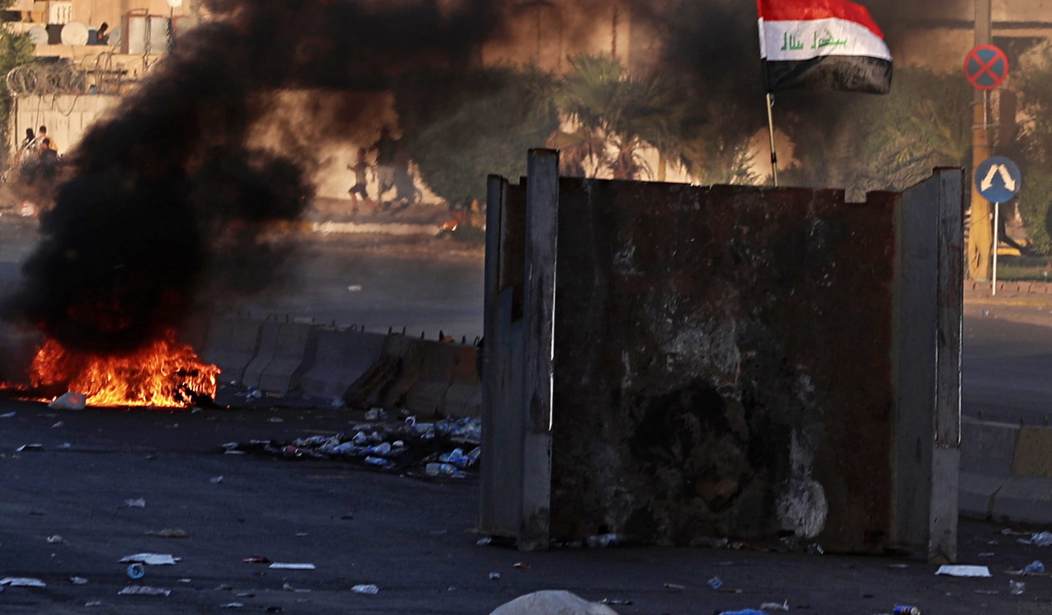Iraq has exploded into violence over the last five days as citizens, angered at unemployment, corruption, and poor public services, took to the streets by the thousands to protest against the government.
The BBC reports that nearly 100 people are dead with thousands injured. At least 200 people have been arrested and police have opened fire on protesters in recent days.
On Saturday, AP reported that eight protesters have been killed and 17 wounded.
The clashes came after authorities earlier in the day lifted a round-the-clock curfew in the capital meant to quell the unrest, sparked by popular anger over lack of jobs and endemic corruption in the oil-rich country.
The violence brought to 72 the total number of people killed over five days of protests, deepening the country’s political crisis. The semi-official Iraqi High Commission for Human Rights, affiliated with the parliament, put the death toll at 94. It said nearly 4,000 people have been wounded since Tuesday.
The unrest is the most serious challenge for Iraq since the defeat of the Islamic State group two years ago.
Prime Minister Adil Abdul-Mahdi’s government is less than a year old, but was elected on promises to end corruption. But popular anger at a moribund economy and continued squabbling among factions appears to have boiled over.
The spontaneous rallies started as mostly young demonstrators took to the streets demanding jobs, improved services like electricity and water, and an end to corruption in the oil-rich country.
“We will keep going and we won’t back down,” said Abbas Najm, a 43-year-old unemployed engineer, who was part of an earlier rally Saturday in Tahrir Square demanding an investigation into the killing of protesters. “It has been 16 years of corruption and injustice. We are not afraid of bullets or the death of martyrs.”
Protesters gathered in Tahrir Square earlier Saturday raised banners demanding the resignation of Prime Minister Adel Abdul-Mahdi and an investigation into the killings of protesters. One read: “Adel Abdul-Mahdi must resign immediately.”
The Jerusalem Post argues that shooting with live ammunition by snipers is a deliberate tactic by the government and could be carried out by Iranian-backed militias.
To support the narrative of Iran’s role there have been stories about “Farsi speakers among the security forces” and “units changing uniforms” before attacking protesters. There are stories about plain-clothes officers among the security forces which leads to claims those in plain clothes are outsiders. In this narrative, spread in Arabic on social media, an “Iranian Revolutionary Guard Brigade” was permitted to enter Iraq by Fatah Alliance leader Hadi al-Amiri. Evidence? Some people tweeting about it.
The claim of foreign interference goes both ways. Others have pointed out that a concerted social media effort has been made to fuel protests and some of the accounts are located abroad. Lastly voices in pro-Iranian media have portrayed the protests as directed by foreign powers. None of these stories present a full picture of what happened. Like the proverbial elephant, they all only capture one part of what happened. From the first moments of the protest the security forces that were sent used heavy-handed tactics. Video showed men in camouflage uniforms, heavily armed, involved in clashes, as well as other police-style units in darker uniforms.
It’s a believable charge but I doubt whether it could be proven. Those Iranian-backed militias made the difference against ISIS, but have now become an armed political force in peacetime. Old U.S. nemesis Muqtada al-Sadr has played a prominent role as spokesman for some of the groups, and has called on Prime Minister Abdul-Mahdi to resign.
This is not a civil war. But if the government continues to use bullets to negotiate with the demonstrators, it may become one.










Join the conversation as a VIP Member